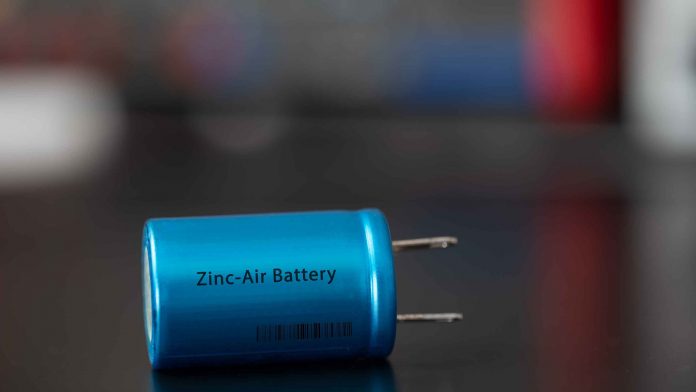Battery researchers at Australia’s Edith Cowan University have made a groundbreaking discovery in the world of electric vehicle (EV) batteries. Their research sheds light on the potential advantages of zinc-air batteries over the widely used lithium-ion batteries. Zinc-air batteries could be cheaper and safer than Lithium-ion batteries.
Zinc-Air Batteries: A Brief Overview
The Basics of Zinc-Air Batteries Zinc batteries, often considered one of the oldest energy storage systems, utilize a zinc anode (negative electrode) and a cathode composed of air (positive electrode). However, it’s worth noting that traditional zinc-air batteries have limitations, including restricted power output and sensitivity to environmental conditions like humidity and temperature.

The Redesign: Overcoming Limitations
Transforming Zinc-Air Batteries Researchers at Edith Cowan University have embarked on a journey to address these inherent drawbacks of zinc-air batteries. They’ve introduced a range of new materials, including carbon, more affordable iron, and cobalt, to enhance battery performance. Their findings suggest that these redesigned zinc-air batteries could revolutionize energy storage.
Advantages of Redesigned Zinc-Air Batteries:
low-cost and Eco-Friendly One of the key takeaways from this study is that these revamped zinc-air batteries have the potential to be not only cost-effective but also environmentally friendly. Their reliance on abundant zinc resources, especially in countries like Australia, coupled with the ubiquity of air, makes them a reliable and sustainable energy storage solution.
High Energy Density Moreover, these batteries boast an impressive energy density, theoretically speaking. This means they can store a significant amount of energy relative to their size, making them an attractive option for electric vehicles.
The Future of Battery Technology
Ongoing Research While zinc-air batteries show promise, they are just one piece of the puzzle in the evolving world of battery technology. Various countries are actively conducting research to further improve energy storage solutions. For instance, General Motors recently invested $60 million in Mitra-Chem, a Silicon Valley startup focused on iron-based cathode active materials and cutting-edge machine learning algorithms.
Toyota’s Breakthrough in Solid-State Batteries In July 2023, Toyota made headlines with its claim of a major breakthrough in solid-state battery technology. These batteries could offer remarkable range (745 miles) and quick 10-minute recharging times, potentially transforming the EV landscape.
Stellantis’ Innovative Battery Integration Stellantis, in collaboration with France’s National Centre For Scientific Research (CNRS), is working on an Intelligent Battery Integrated System (IBIS). This innovative battery prototype integrates the inverter and charger functions within the modules, aiming to revolutionize EVs by the end of the decade.
As the world races toward sustainable and efficient energy solutions, the choice of battery technology remains a critical factor. While zinc-air batteries present a promising alternative to lithium-ion batteries, the landscape of battery innovation is rich and diverse. It’s an exciting time for EV enthusiasts and researchers alike, as we witness breakthroughs that could reshape the future of transportation.
Source:https://headtopics.com/us/
Read our previous articles: Utilizing 239 Million-Year-Old Fossils to Enhance the Search for Martian Aliens
https://scitechupdate.com/index.php/android-14-satellite-sms-for-everyone/
https://scitechupdate.com/index.php/chemistry-entrepreneurship/
https://scitechupdate.com/index.php/waste-paper-to-battery-components-for-smarts-phones-vehicles/https://scitechupdate.com/index.php/ai-demonstrated-95-accuracy-in-listening-typing-and-data-processing/
https://scitechupdate.com/index.php/top-7-technology-trends-of-2023-from-ai-to-5d-technology/

